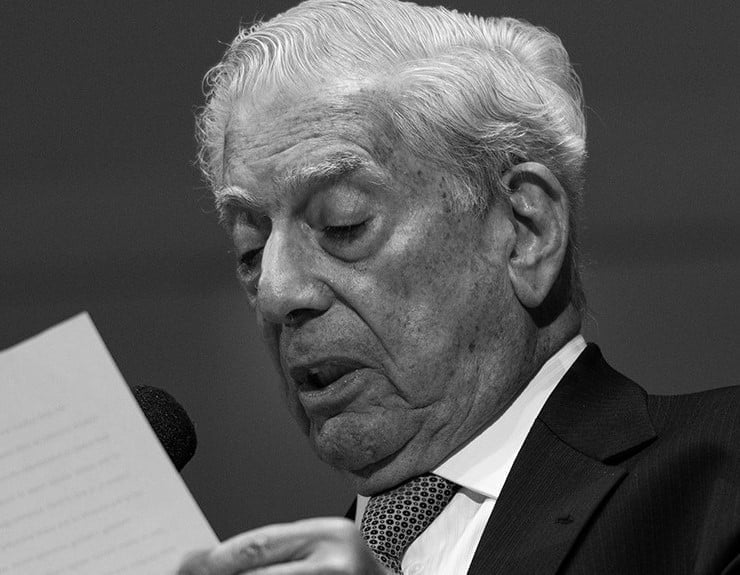
Mario Vargas Llosa
Mario Vargas Llosa was born in 1936 in Arequipa, Peru, and grew up in Bolivia, northern Peru and Lima. There he studied literature and law and received his doctorate in Madrid. Together with García Márquez, Cortázar, and Fuentes, he belongs to the quartet of the boom in Latin American literature. He wrote his first three novels – most notably the masterpiece »Conversación en La Catedral« (1969) – in Europe, where he lived in Paris, London, and Barcelona. In 1975, he returned to Peru and became increasingly involved in politics. As a candidate for the Peruvian presidential elections, he lost to Alberto Fujimori in 1990. With his commitment to democracy and individual freedom, he can be considered a moral authority.
Vargas Losa’s early novels are characterized by advanced literary forms and a precise polyphonic structure. In an effort to create the »total novel«, he draws from the kaleidoscope of Peruvian society using fragments of historical and geographical descriptions, a diversity of plots and epochs, and the memories, experiences, dialogues and fantasies of different social classes. An important source of inspiration has always been his own biography: his debut novel »La ciudad y los perros« (1962; Eng. »The City and the Dogs«, 1963) refers to his traumatic experiences at a cadet school, whereas »La tía Julia y el escribidor« (1977; Eng. »Aunt Julia and the Scriptwriter«, 1983) remembers the young author’s marriage to his aunt, who was 14 years his senior. While the satirical tone and erotic descriptions persisted in later works, Vargas Llosa increasingly reduced the narrative complexity of his work, which also includes literary and political essays, lectures and memoirs. In »El sueño del celta« (2010; Eng. »The Dream of the Celt«) the main character reflects on the horrors of colonialism. His most recent novel, »Tiempos recios« (2019; Eng. »Fierce Times«, 2020) tells of the fall of Guatemalan President Árbenz in 1954 through CIA intervention on the occasion of the threatened monopoly position of the American United Fruit Company, which plunged Latin America into a long-term devastating economic situation.
Vargas Llosa was president of the international PEN and is a member of the Reál Academía Española. He also holds several honorary doctorate degrees (including from the Humboldt University in Berlin). »For his cartography of structures of power and his trenchant images of the individual’s resistance, revolt, and defeat« Mario Vargas Llosa was awarded the Nobel Prize for Literature in 2010. Further distinctions include the Premio Cervantes, the Peace Prize of the German Book Trade, the National Book Critics Circle Award, the Premio Ortega y Gasset, and the PEN/Nabokov Award. He lives in Madrid, Paris, and New York.
Watch Mario Vargas Llosa at the 20th ilb on our YouTube-Channel:
Die Stadt und die Hunde
Rowohlt
Reinbek, 1965 [Ü: Wolfgang A. Luchting]
Gespräch in der »Kathedrale«
Suhrkamp
Frankfurt a. M., 1984 [Ü: Wolfgang A. Luchting]
Der Krieg am Ende der Welt
Suhrkamp
Frankfurt a. M., 1984 [Ü: Anneliese Botond]
Das Fest des Ziegenbocks
Suhrkamp
Frankfurt a. M., 2001 [Ü: Elke Wehr]
Die Welt des Juan Carols Onetti
Suhrkamp
Frankfurt a. M., 2009 [Ü: Angelica Ammar]
Der Traum des Kelten
Suhrkamp
Berlin, 2011 [Ü: Angelica Ammar]
Tante Julia und der Schreibkünstler
Suhrkamp
Berlin, 2011 [Neu-Ü: Thomas Brovot]
Ein diskreter Held
Suhrkamp
Berlin, 2016 [Ü: Thomas Brovot]
Die Enthüllung
Suhrkamp
Berlin, 2016 [Ü: Thomas Brovot]
Harte Jahre
Suhrkamp
Berlin, 2020 [Ü: Thomas Brovot]
